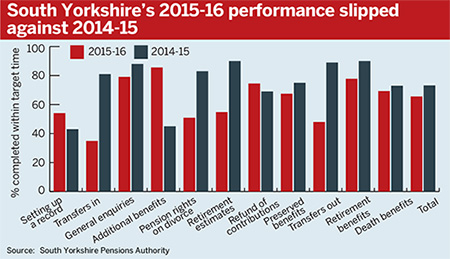A number of local authority schemes have faced administration challenges and missed deadlines after implementing new software, as the provider struggled with capacity troubles.
The South Yorkshire Pensions Authority failed to meet a number of its administration targets in the year to March, after a change in providers led to backlogs in administration work.
The fund appointed technology provider Civica after participating in a national framework for pensions software led by Kent County Council.
I’m afraid that our response levels fell well short of our traditionally high standards
Sue Ellis, SYPA
The Authority previously missed the delivery deadline for member benefit statements as a result of the shift. It has now released details of other impacts but said service levels are recovering at the scheme.
Drop in admin performance
Writing in the fund’s most recent annual report, Councillor Sue Ellis, chair of the SYPA said: “It soon became clear that the winning contractor had not allocated enough resources to the transition and service levels fell dramatically.”
She added: “Officers were required to work overtime in order to prevent backlogs becoming unmanageable and I’m afraid that our response levels fell well short of our traditionally high standards.”

Ellis went on to say that the authority summoned senior management from the provider twice “and our displeasure was made quite clear”.
A spokesperson for the scheme said: “Circumstances imposed by our previous supplier forced us to run live 12 months before we were ready. Recovery is ongoing but problems have been solved through a combination of supplier support and us getting to grips with the system internally.”
The disruption caused a drop in the fund’s performance of key admin tasks to 65.6 per cent for 2015–16, down from 73.3 per cent in 2014–15.
SYPA was not the only one to suffer
Other authorities affected were Cheshire, Derbyshire, Durham, Essex, Hampshire, Kingston & Sutton, and Nottinghamshire.
Jeff Garfoot, head of corporate finance and human resources at Durham County Council, said: “As with all large-scale IT systems, we’ve experienced some teething problems since the new software was brought in, however, we continue to work closely with Civica to address these.”
A spokesperson for Civica said: “Due to the time pressures imposed on the authorities, the implementation had to be completed in a shortened timeframe; made more complex by the belated announcement of new local government, police and fire pension rules.”
The spokesperson added: “Some delays were experienced in aspects of the implementation due to the tight timescales, which inevitably caused some impact to scheme providers.
“During this period, the company worked closely with clients to minimise this impact wherever possible and we continue to work closely with those clients to achieve a lower cost of ownership while maintaining a high-quality service.”
LGPS faces multi-employer challenge
Local government schemes are structured and run differently from corporate defined benefit or defined contribution schemes, especially in light of the government’s proposed new power to oversee their investment decisions.
“There are some unique difficulties and challenges for LGPS funds and multi-employer [schemes],” said Karen McWilliam, head of public sector governance and benefits consultancy at Aon Hewitt, giving the example of the number of employers participating in the scheme, each with potentially different payroll software and processes.
“The multi-employer perspective is not unique to the LGPS, but it’s a big challenge and becoming a bigger challenge,” she said.
One reason for this is the conversion of schools into academies. Non-teaching school employees are typically employed through the council, but academies are scheme employers in their own right that pay into the council scheme.
The Scheme Advisory Board last month announced it had appointed consultancy PwC to examine the issues a proliferation of academies would create for local authority schemes.
S.Yorks misses deadline as admin woes heap pressure on LGPS
Teething issues following an administration overhaul at South Yorkshire Pensions Authority has delayed the delivery of members’ annual statements, amid a challenging backdrop of wider fundamental reform across the Local Government Pension Scheme.
Software hardship
Changing software systems can often be a source of trouble, said Daniel Taylor, director at administration specialist Trafalgar House, adding: “That can have an impact on member servicing.”
Careful planning is therefore needed, as Taylor said that “system change isn’t about the data, it’s about everything that hangs on it”.
There are “so many different parts that need to come together, not least training people to use two systems simultaneously”, he said, noting that where systems are changed, the scheme will often overlap the running of each to minimise risk, at the cost of temporarily increased workload.

























